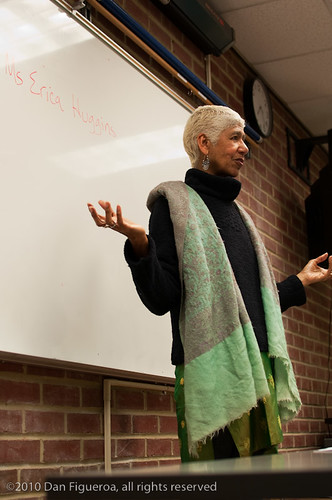
Activist stresses human value of women, need for men to work to end sexism
By Reginald James
TheBlackHour.com Editor
Activist and former Black Panther leader Ericka Huggins addressed an overflowing African American Studies class Feb. 22 at Laney College.
As a part of campus' Black History Month program, Huggins engaged students in a discussion themed, “Women, Social Justice and Economics.” She discussed the historical dehumanization and discrimination Black women faced and how the “multi-generational trauma” of slavery has forced Black women to face dual oppression due to both race and gender.
Black women were a commodity, and “not just (their) labor, but bodies were sold,” Huggins said. “Slavery was economic leverage for everything else that happened to other people immigrating, migrating or forced to be here” in America.“If she’s taught she has no right to respond, she will accept it and go into a shell. Rather than explode in confrontation, she will implode. She might begin to hate herself."
Ericka Huggins, on sexism
This legacy of oppression has led to some women internalizing feelings of inferiority, and even self-hatred, Huggins said.
“If she’s taught she has no right to respond, she will accept it and go into a shell,” Huggins said, referring to how women react to sexism. “Rather than explode in confrontation, she will implode.
“She might begin to hate herself.” Huggins told the story of Johnnie Tillman, an early 20th century female activist who founded the National Welfare Rights Organization in response to Black women being barred from receiving welfare. Refuting the stereotype of Black women as “welfare queens” in a “culture of poverty,” she told the story of women fighting for dignity, while seeking assistance. She called the suggestion that women would have a baby for the purpose of collecting a check, “male-thinking.”
Huggins told the story of Johnnie Tillman, an early 20th century female activist who founded the National Welfare Rights Organization in response to Black women being barred from receiving welfare. Refuting the stereotype of Black women as “welfare queens” in a “culture of poverty,” she told the story of women fighting for dignity, while seeking assistance. She called the suggestion that women would have a baby for the purpose of collecting a check, “male-thinking.”
As a single mother and member of the Black Panther Party, working 19 hour days, Huggins received welfare. She felt dehumanized, not because she received public assistance, but because her male case worker spied on her and invaded her privacy, like a slave plantation.
“During that time, I’ve never been so devalued and humiliated in my life,” Huggins explained. Even after Tillman’s struggle, “the vestiges of discriminatory policies in welfare remained.
Huggins was widowed when her husband, John Huggins, was assassinated at UCLA by the FBI’s Counterintelligence Program (COINTELPRO), she said. People would judge her negatively because she was a single parent, not knowing why.
Not deterred from the struggle, the former director of the Panther’s Oakland Community School is still an educator. She currently teaches Women’s Studies at Cal State East Bay and San Francisco State. However, due to budget cuts, she will not be able to teach in the fall. She encouraged students to be organized to created a world they want to live in. She asked students for suggestions on improve conditions for women in the U.S."If Johnnie Tillman started the National Welfare Rights Organization in a little room in a housing project in Arkansas, each of us can step up and step forward.”
Ericka Huggins
“We can mobilize women, joining together with men so that we can pressure the state to allocate more funds to programs we need,” Laney College student Terez McCall said.
Huggins concluded that, “If Johnnie Tillman started the National Welfare Rights Organization in a little room in a housing project in Arkansas, each of us can step up and step forward.”
“We think we can’t because we’ve been told that we’re powerless, we can do things.”
Photos courtesy of DanFigPhoto.com
Ericka Huggins speaks at Laney College
Wednesday, March 17, 2010
The Black Hour


